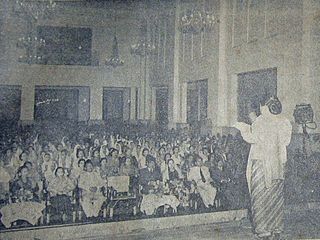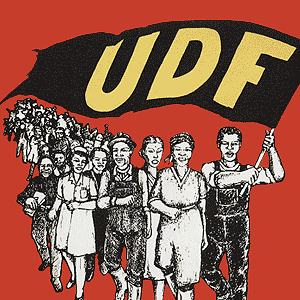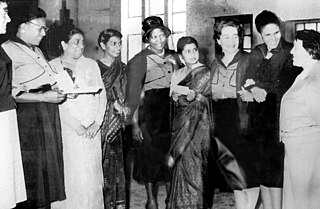Related Research Articles
Triple oppression, also called double jeopardy, Jane Crow, or triple exploitation, is a theory developed by black socialists in the United States, such as Claudia Jones. The theory states that a connection exists between various types of oppression, specifically classism, racism, and sexism. It hypothesizes that all three types of oppression need to be overcome at once.

The Party of the Democratic Revolution is a social democratic political party in Mexico. The PRD originated from the Democratic Current, a political faction formed in 1986 from the Institutional Revolutionary Party (PRI). The PRD was formed after the contested general election in 1988, which the PRD's immediate predecessor, the National Democratic Front, believed was rigged by the PRI. This sparked a movement away from the PRI's authoritarian rule.

The People's Front for Democracy and Justice is the founding, ruling, and sole legal political party of the State of Eritrea. The successor to the left-wing nationalist Eritrean People's Liberation Front (EPLF), the PFDJ holds itself open to nationalists of any political affiliation. The leader of the PFDJ party and current President of Eritrea is Isaias Afwerki. It has been described as totalitarian.

Ella Josephine Baker was an African-American civil rights and human rights activist. She was a largely behind-the-scenes organizer whose career spanned more than five decades. In New York City and the South, she worked alongside some of the most noted civil rights leaders of the 20th century, including W. E. B. Du Bois, Thurgood Marshall, A. Philip Randolph, and Martin Luther King Jr. She also mentored many emerging activists, such as Diane Nash, Stokely Carmichael, and Bob Moses, as leaders in the Student Nonviolent Coordinating Committee (SNCC).

The ECOPEACE Party is a national environmentalist political party in South Africa founded in 1995. The party was formerly known as eThekwini ECOPEACE and eThekwini Ecoparty—eThekwini is the Zulu name for Durban, where the party is based. The Zulu party motto is Buhlakuleni uButhi, Yitshaleni iMithi, which translates to "Uproot Poisons, Replant Trees ".

Gerwani was a women's organization founded as Gerwis in Semarang, Central Java, on 4 June 1950.

The United Democratic Front (UDF) was a South African popular front that existed from 1983 to 1991. The UDF comprised more than 400 public organizations including trade unions, students' unions, women's and parachurch organizations. The UDF's goal was to establish a "non-racial, united South Africa in which segregation is abolished and in which society is freed from institutional and systematic racism." Its slogan was "UDF Unites, Apartheid Divides." The Front was established in 1983 to oppose the introduction of the Tricameral Parliament by the white-dominated National Party government, and dissolved in 1991 during the early stages of the transition to democracy.

The Global Greens (GG) is an international network of political parties and movements which work to implement the Global Greens Charter. It consists of various national Green political parties, partner networks, and other organizations associated with green politics.
Masculism or masculinism may variously refer to ideologies and socio-political movements that seek to eliminate sexism against men, equalize their rights with women, and increase adherence to or promotion of attributes regarded as typical of men and boys. The terms may also refer to the men's rights movement or men's movement, as well as a type of antifeminism.

The Transitional Government of Ethiopia (TGE) was an era established immediately after the Ethiopian People's Revolutionary Democratic Front (EPRDF) seized power from the Marxist-Leninist People's Democratic Republic of Ethiopia (PDRE) in 1991. During the transitional period, Meles Zenawi served as the president of the TGE while Tamrat Layne was prime minister. Among other major shifts in the country's political institutions, it was under the authority of the TGE that the realignment of provincial boundaries on the basis of ethnolinguistic identity occurred. The TGE was in power until 1995, when it transitioned into the reconstituted Federal Democratic Republic of Ethiopia that remains today.
Women experienced repression under apartheid in a distinct way. Black women held the lowest position in the social hierarchy with Indian and coloured women faring slightly better, and white women being the most favoured. Apartheid defined all black citizens as secondary to white citizens, however black women were assigned an even lower status through both laws and social norms. This has been coined the “triple oppression” of race, class, and gender. Women had authority in pre-colonial Africa as they were the main agricultural producers, however, when farming declined in importance women lost their authority and status meaning they were left with no real place or role in society. The traditions of communities within South Africa were the basis of the gender discrimination present under apartheid. Under traditional law women were denied the right to own land, the right to custody of their children, and the right to be chief or elected as chief. This reinforced apartheid ideology as well as the legacies of colonialism which classified women as second-class citizens.

The Constitution of the Autonomous Administration of North and East Syria, officially titled Charter of the Social Contract, is the provisional constitution of the self-proclaimed autonomous region known as the Autonomous Administration of North and East Syria. It was adopted on 29 January 2014, when the Democratic Union Party (PYD), the political wing of the People's Protection Units (YPG) and the largest party in the autonomous region, declared the three regions it controlled autonomous from the Syrian government. Article 12 states the autonomous region remains an "integral part of Syria", anticipating a future federalization of Syria.

The Uganda Women's Network (UWONET) is a Ugandan non-governmental organization (NGO) working to advance public policy regarding women's rights. It is an umbrella organisation of national women's NGOs and individuals operating in East Africa. The executive director is Rita H. Aciro-Lakor.

The Federation of South African Women (FEDSAW) was a political lobby group formed in 1954. At FEDSAW's inaugural conference, a Women's Charter was adopted. Its founding was spear-headed by Lillian Ngoyi.

Feminism in South Africa concerns the organised efforts to improve the rights of the girls and women of South Africa. These efforts are largely linked to issues of feminism and gender equality on one hand, and racial equality and the political freedoms of African and other non-White South African ethnic groups on the other. Early feminist efforts concerned the suffrage of White women, allowing them to vote in elections beginning from 1930s, and significant activism in the 1950s to demand equal pay of men and women. The 1980s were a major turning point in the advancement of South African women, and in 1994, following the end of the apartheid regime, the status of women was bolstered by changes to the country's constitution. Since the end of apartheid, South African feminism is a contribution associated with the liberation and democratization of the country, however, the movement still struggles with the embedded conservative and patriarchal views within some segments of South African society.
The Natal Organisation of Women (NOW) was a regional women's organization in South Africa in the Natal area. NOW was founded in 1983 and affiliated with the United Democratic Front (UDF). NOW included women from all ages, class and races. NOW's values were in opposition of those expressed by the Inkatha's women's groups.
The Institute for Democratic Alternatives in South Africa (IDASA) later known as the Institute for Democracy in South Africa was a South African-based think-tank organisation that was formed in 1986 by Frederik van Zyl Slabbert and Alex Boraine. Its initial focus from 1987 was creating an environment for white South Africans to talk to the banned liberation movement in-exile, the African National Congress (ANC) prior to its unbanning in 1990 by the President F. W. de Klerk. After the South African election in 1994, its focus was on ensuing the establishment of democratic institutions in the country, political transparency and good governance. Caught up in a funding crisis after the 2008 global financial crisis, closed in 2013.
The Gay and Lesbian Organization of Witwatersrand (GLOW) was a non-governmental organization in South Africa that focused on gay and lesbian community issues.
The Victoria Schuck Award is an annual prize granted by the American Political Science Association to the author of the best book published in the previous year on the topic of women and politics. The award is named in honor of the political scientist Victoria Schuck. Although a number of area-specific sections of the American Political Science Association have dedicated book awards, the Schuck Award is one of only a few awards given directly by the Association rather than by a subsection of it.
Shireen Hassim is an South African political scientist, historian, and scholar of gender studies and African studies. She is a Professor in the Department of Political Studies at the University of the Witwatersrand, where she is also affiliated with the Institute for Social and Economic Research. In 2019 she became a Canada 150 Research Chair in Gender and African Politics, beginning a seven-year term in the Institute for African Studies at Carleton University. Hassim was the first black woman full professor of political science in South Africa.
References
- ↑ "The Women's National Coalition | South African History Online". www.sahistory.org.za. Archived from the original on 2011-09-09.
- ↑ "Gender and Human Rights". Mail and Guardian. 6 December 2005. Retrieved 13 July 2014.
- ↑ Thipe, Thuto. "We are all products of history, but each of us can choose whether or not to become its victims": an exploration of the discourses employed in the Women's National Coalition." (2012).
- ↑ Hassim, Shireen. Women's organizations and democracy in South Africa contesting authority. Madison: University of Wisconsin Press, 2005: 148
- 1 2 Hassim, Shireen. "Voices, hierarchies and spaces: reconfiguring the women's movement in democratic South Africa." Politikon: South African Journal of Political Studies 32, no. 2 (2005): 175-193.
- ↑ Tshoaedi, Malehoko. "(En) gendering the transition in South Africa: the role of COSATU women activists." Transformation: Critical Perspectives on Southern Africa 78, no. 1 (2012): 1-26.
- ↑ Njiro, Esther. "Introduction: Sustainable: Development an Oxymoron?." Agenda (2002): 3-7.